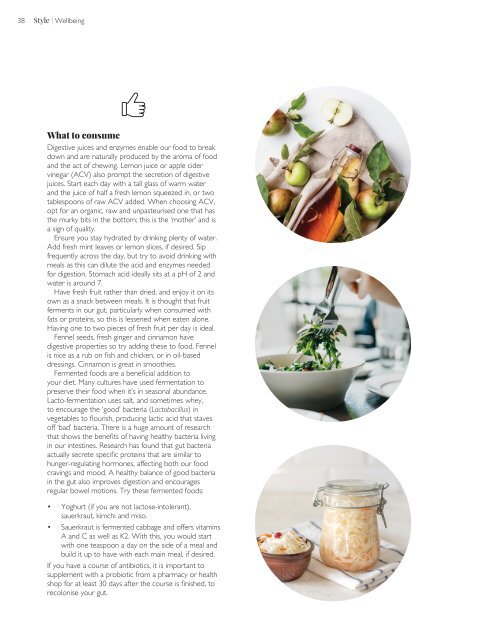Create successful ePaper yourself
Turn your PDF publications into a flip-book with our unique Google optimized e-Paper software.
38 <strong>Style</strong> | Wellbeing<br />
What to consume<br />
Digestive juices and enzymes enable our food to break<br />
down and are naturally produced by the aroma of food<br />
and the act of chewing. Lemon juice or apple cider<br />
vinegar (ACV) also prompt the secretion of digestive<br />
juices. Start each day with a tall glass of warm water<br />
and the juice of half a fresh lemon squeezed in, or two<br />
tablespoons of raw ACV added. When choosing ACV,<br />
opt for an organic, raw and unpasteurised one that has<br />
the murky bits in the bottom; this is the ‘mother’ and is<br />
a sign of quality.<br />
Ensure you stay hydrated by drinking plenty of water.<br />
Add fresh mint leaves or lemon slices, if desired. Sip<br />
frequently across the day, but try to avoid drinking with<br />
meals as this can dilute the acid and enzymes needed<br />
for digestion. Stomach acid ideally sits at a pH of 2 and<br />
water is around 7.<br />
Have fresh fruit rather than dried, and enjoy it on its<br />
own as a snack between meals. It is thought that fruit<br />
ferments in our gut, particularly when consumed with<br />
fats or proteins, so this is lessened when eaten alone.<br />
Having one to two pieces of fresh fruit per day is ideal.<br />
Fennel seeds, fresh ginger and cinnamon have<br />
digestive properties so try adding these to food. Fennel<br />
is nice as a rub on fish and chicken, or in oil-based<br />
dressings. Cinnamon is great in smoothies.<br />
Fermented foods are a beneficial addition to<br />
your diet. Many cultures have used fermentation to<br />
preserve their food when it’s in seasonal abundance.<br />
Lacto-fermentation uses salt, and sometimes whey,<br />
to encourage the ‘good’ bacteria (Lactobacillus) in<br />
vegetables to flourish, producing lactic acid that staves<br />
off ‘bad’ bacteria. There is a huge amount of research<br />
that shows the benefits of having healthy bacteria living<br />
in our intestines. Research has found that gut bacteria<br />
actually secrete specific proteins that are similar to<br />
hunger-regulating hormones, affecting both our food<br />
cravings and mood. A healthy balance of good bacteria<br />
in the gut also improves digestion and encourages<br />
regular bowel motions. Try these fermented foods:<br />
• Yoghurt (if you are not lactose-intolerant),<br />
sauerkraut, kimchi and miso.<br />
• Sauerkraut is fermented cabbage and offers vitamins<br />
A and C as well as K2. With this, you would start<br />
with one teaspoon a day on the side of a meal and<br />
build it up to have with each main meal, if desired.<br />
If you have a course of antibiotics, it is important to<br />
supplement with a probiotic from a pharmacy or health<br />
shop for at least 30 days after the course is finished, to<br />
recolonise your gut.


















